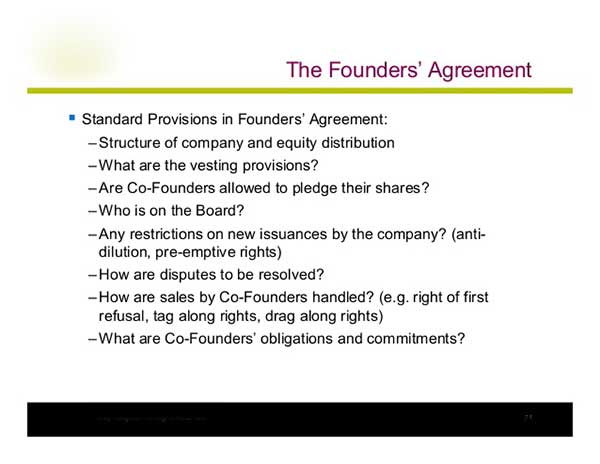Start-ups are all about taking risks. True.
But, when it comes to legal issues concerning an entrepreneurial venture, precaution is always better than cure.
It would be such a pity if a great business idea, support from family and friends and good amount of capital investment all goes for a toss for nothing but legal matters that you did not care to notice or avoided just because they seemed plain boring to you or you were not aware of certain laws.
Well, in India this has been a common case. Take for example, the SuKam entrepreneur who landed up in jail for the simple reason that he did not know he had to pay excise duties. Also, bribing and non-implementation of laws plus a slow and inefficient judicial system are all issues that are too difficult to handle in this country.
Starting and growing a business in India is a tough nut to crack mainly because of the regulatory and legal system that makes the whole process so complex, especially when even written agreements are not honoured by the parties at the other end, licenses need bribing and waiting and maintaining registers, paying huge taxes and accepting money from foreign investors, all of it starts to haunt on you.
Also witnessing the scenario in India and as it has been in all these years, it seems a faint possibility that anything in the legal and judiciary industry will ever face the winds of change.
While bigger, more established companies like Tata, Birla, Reliance, Infosys, Larsen and Tubro, etc. spend huge stacks of cash just to sort out their legal hassles and issues with the regulatory bodies and judicial systems, you have probably just started or are about to start with your new business and cannot afford spending crores of rupees just on legal bills!
Customizing Legal documents and employing a lawyer for the company is not possible until and unless the company starts generating some handsome revenue. However, if you look at the larger picture, the costs aggravate much more when legal issues start cropping up.
So follow these tips and emphasize as much on the legal matters as on other factors related to the stability and exponential growth of your business:
Agreements between Company Founders
The ownership matters should be decided at the very beginning if there is more than one founder in the company. This is ideal to be done in writing after the verbal agreement. Also, if there is an accidental departure or demise of one of the founders, then what should be the further course of action? These things should be settled at the very earliest as a part of company’s confidential documents/agreements so that the company is not left to be partially owned and managed by one of the founders with innumerable uncomforting questions from investors and supporters of the business.
Also, if you plan to incorporate later in the business, there are many online services for legal advices that will serve you better and will be more cost-effective than Lawyers and Chartered Accountants.
You can also enter into a Limited Liability Partnership (LLP) in order to save yourself from the co-founder’s misconduct or negligence and even from heavy tax bills. LLP’s can easily be changed into a full-time Private Sector Firm as well, later. Taking the valuable guidance of senior mentors and investors as well as some other successful entrepreneurs, especially in your field of business can prove to be fruitful in the long run.
IP Ownership
The ownership of your business and all the legal documents supporting that is mandatory for you to take any decisions in favour of the company and even if you plan to sell it later. From tax registrations to trade licenses to Shop and Establishment Registration to even Labour and Employment registrations, you will have to go through a lot of legal documents to obtain licenses in India which are many with respect to a business in India. Investors are also pretty careful and vigilant on license issues before they enter in any kind of pact with a company so to keep investments coming in and growing each day, it is necessary to take care of the licenses.
You can also save yourself from lawsuits and heavy fines and eventual shut-down of your company by keeping a track of the license conditions, knowing the necessary licenses you need to get and whether you are fulfilling all conditions for each of the licenses you require.
Equity Grants
The amount of shares both founders own in the company is an important matter for both and needs proper focus and attention at the very start of the business venture.
Tax Deals
If you are starting with a low-key business affair then you may not have to pay any taxes. But, as you plan on expanding your business or if you have started with a fairly big start-up venture as per the size, investment and team members of the company, tax officers will start bugging you and might even start looking at all transactions you have made till date, even when you were not that big in the market. So, before it all becomes a costly affair with you ending up paying your entire business capital and even more than that to the tax lawyers and undergo the fear of imprisonment, big lawsuits and accusations of criminal offenses against your account dealings and tax issues and have to pay massive fines, clear the tax deals before even entering the radar of the tax officers.
Different Types of Contracts with Vendors and Investors and their Enforcement
Depending on the type of business you acquire, you also need to sign contracts with different vendors and as there is a variety in the vendor list, so is there a variety in the contracts signed with vendors. Whenever you opt for outside assistance for product or service design and development, contract management becomes essential whether it be content-based agreements, ad contracts, distributorship pacts or franchisee contracts.
Also, enforcing contracts through non-compete clauses, arbitration or out-of-court settlements, strategies through which you can recover money or registration agreements can land you in a better position where your partners, employees, consultants in your company and other people you are related to via your business will not let you down on the obligations in the agreements.
If you do not want to get trapped in the legal pitfall, then following these tips before the issues arise will help you triumph in your entrepreneurial venture at the end!










